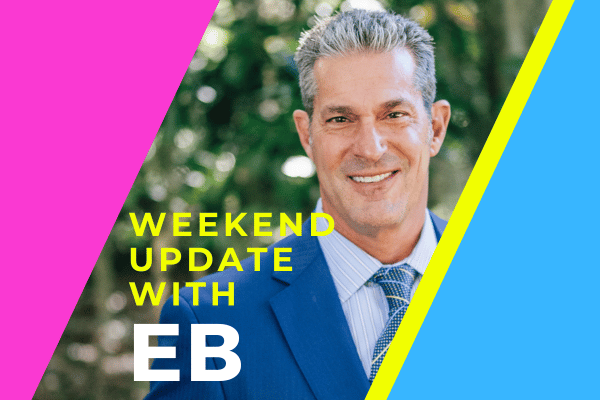Potential witness list vs actual witness list – how does a prosecution team decide who will actually get called to testify in trial? Is there any strategy by putting someone on the possible witness list but have no intention of calling to testify?
TRANSCRIPT
Hello Premium Members, EB here. I had a long day today I had a big plea of guilt for one of my clients this morning and it was rather emotional. There was a lot of people in attendance who wanted to speak and a lot of pressure to get a decent sentence for my client. And so I’m back. I’m now in my office. I’m thinking about what we’re going to talk about this week.
The first thing we’re going to talk about is on Tuesday, Liz and I just had the most magical hour interviewing Julie Grant from CourtTV, she does “Opening Statements” in the morning; Vinnie Politan, obviously does “Closing Arguments” at night. And she just is an extremely warm, kind, embracing journalist. She’s a lawyer, former trial lawyer, she was a prosecutor up in Allegheny, Pennsylvania in the Pittsburgh area, she’s from Ohio. And she is, you know, a true victims advocate journalist. She doesn’t just do straight down the middle reporting, she takes positions. And I think when you hear her interview, which I assume will come out next week, you will really enjoy it. She just, she gave us a lot of good insight on how she views the justice system and what her role is on CourtTV. So I really enjoyed that.
I’m going to be on Surviving the Survivor podcast and talking about the Karen Read trial. Karen Reed is on trial for second degree murder in Canton, Massachusetts, for allegedly running over her boyfriend who was a police officer, O’Keefe, in the snow. And it’s going to be a very long trial and they’re starting to, you know, attack through cross examination, the police officer who died and that there was supposedly, you know, another, maybe another woman involved and very neat evidentiary issues because they’re introducing a glass that was broken, and they’re contending that the officer had the glass in his hand while she allegedly drove over him. He was found in a snowdrift off to the side of the road. Very interesting trial, it’s getting a lot of national attention.
The other trial that’s getting a lot of national attention is the Gregor trial. This is an extremely sad trial. This is a father who is on trial for the death of his five year old son, who he put on the treadmill. There were allegations that the father, you know, didn’t like the weight gain of the five year old kid, can you believe it, and he put the kid on the treadmill in a gym, made him run to the point that the kid fell off the treadmill, he had it so fast, and he put the child on the treadmill again and the child fell off again. And the child was very lethargic for the next couple of days and clearly exhibited delirium and vomiting and different things that a parent should have immediately taken their child to the hospital. Five days later, the father carried the young child, the son who was almost passed out into the hospital as shown on video and was indifferent when he brought the child in. The child they started to attend to immediately. The father had left the room in the hospital while the job was being attended to. He came back, the child died, unfortunately. And he left with, you know, not showing any emotion which is just absolutely extraordinary. And it seems that the defense is going to raise the prospect that the child died from sepsis as a result of having pneumonia instead of being literally run to death. It is one of, you know, you see these occasional murders where there’s just so much lack of empathy and indifference on the part of the person who is accused of murder that it’s chilling.
So we also have the Colucci trial, and unfortunately, the Colucci trial got continued. It’s really unfair to the victim and to their family, and the witnesses that prepare for a trial, only to have it continued. And I think Liz Farrell said it’s continued possibly till July. A continuance usually is requested not by the prosecution in our state, because the prosecution calls the trial. The reason for the continuance in this case was they only allocated a week to try the case. And it turned out that the defendant’s attorney is Andy Savage, a tremendous, tremendous, highly skilled trial lawyer, said that it was going to take much longer than a week, almost two weeks. And so what happens is, court administration didn’t allocate enough time for the sitting judge, to be able to have a two week trial, the sitting judge, Judge Jefferson out of Charleston, she only had a week allocated for general sessions, General Sessions is criminal court. Civil Court is obviously similar for civil disputes. So it got continued.
And so the Colucci trial, that continuance resulted because it’s going to be, according to Andy Savage, Michael Colucci’s lawyer, it’s going to be more than a week. Now, what you’ll find is that a lot of times the defense attorney says my case is going to take a week. But after the prosecution’s done, very often, you’ll hear them say the defense rests, we’re not going to put up any evidence and what that means is in criminal cases, a lot of times the defense does their work on cross examination of the prosecution’s witnesses, and they get their defense and their case out through really good, vigilant, harsh cross examination. In criminal trials, the defense very rarely testifies.
Now you saw Alex Murdaugh had to testify in his case, and in Russell Laffitte, he testified in his case. So that goes against the normal axiom that defendants don’t testify. But that’s only because they had to to prove their defenses because it would have had to come out of their mouth. But a lot of times the defense says, oh, we’re gonna have a week for our case. And then when it comes time for them to present their case, they say we rest, because the government did not meet their burden to prove guilt beyond a reasonable doubt. So whether the Colucci case ultimately takes two weeks, we won’t know but it’ll definitely have a judge that can dedicate two weeks to that case. And I also have seen, I’ve been in a trial that has gone longer than the scheduled two weeks, and the judge was supposed to, let’s say, go to another county and start a term of court there. But they have an ability to rearrange their calendar and they get with court administration and court administration will send another judge to that county. So we’ve had a lot of legal cases, a lot of interesting things taking place this week.
And now we’ll move over into our law library, and we’re going to talk about expungement. An expungement exists when you have a criminal record, and you either go through PTI, which is pretrial investigation, or you go on probation, let’s say it’s DUI or something, and you want to get that record expunged, which means removed from the record so that it doesn’t hinder your ability to get a job. So if you’re convicted of a felony, it’s difficult to get your record expunged, because if you’re convicted of a felony, you lose your voting rights, your civil rights, your ability to hold a license and your ability to hold and carry a firearm, which is important to a lot of people. So what happens though, in misdemeanor cases, and other cases where there are, let’s say, petty larceny, or something like that, that could affect your job.
In fact, I am looking at a matter now where somebody is in the nuclear industry and was falsely accused of something. And there’s a record that was later expunged, which was removed from the public record, but the original charges are still there. And so this is a very highly regulated industry where HR people are constantly looking at who’s got access to what. And so this person wants every bit of the incident that he had nothing to do with removed from his record. So it’s expungement and removal and one of the things is, if you get your record expunged, how do you answer a job on an employment application? You know, it depends on what they say, have you ever been arrested? Even though your record is expunged, truthful answer maybe, yes, I got arrested, but the case is expunged, meaning it’s gone. That would be a truthful answer. But some people when they think that they get their record expunged, they don’t answer the question, you know, have you been arrested? Certainly, if you’ve been convicted, if your records expunged, then you no longer have to talk about it.
So with that said, I covered a lot of territory. Looking forward for you guys to listen to SEO j we had our 80th episode. Can you believe it? We talked about the mica Miller matter down in Myrtle Beach. I’m sure the family is going to want to pursue a collateral investigation and some kind of autopsy. You know, they claim that you know, she drove 80 miles up the North Carolina coast from Myrtle Beach and shot herself I think in a park. It’ll be interesting to see you know, was there gunpowder residue on her hand and that’s still not indicative if somebody you know put the gun in her hand and may and shot her. So, you know they obviously ruled it a suicide, but we will see what happens. The family is not going to take that as gospel.
So with that said, EB out.
Please sign into your Premium account then refresh this page to view this content.

